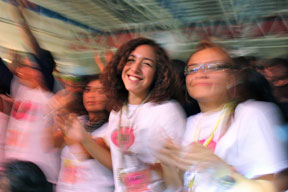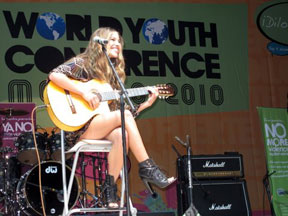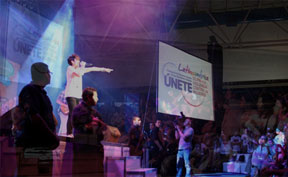Peace stories
South America
Young women in the advance of the peace consolidation processes”

It's ten years, this October, since the UN Resolution 1325 was approved, including the experiences of women in conflicts within the peace and security international agenda, focusing in the effect caused by conflicts in women and girls and calling on for women and young people to participate in solving conflicts and consolidating peace. For this reason and as a way to include the opinions and leadership of the young girls who participate in peace processes, UNIFEM (as part of UN Women), within the World Youth Conference Framework, organized by the Mexican government, arranged the Young Women Forum, in which “Young women in the advance of the peace consolidation processes”, a discussion panel, was launched.
This event was crucial since there is evidence showing that although some advances have been achieved due to Resolution 1325, there are still some gaps in executing this resolution.
Women do not play yet an equal role in peace processes, and their concerns are not fully contemplated in the peace agreements. The studies results indicate that, in a sample of 24 peace processes over the last two decades, young and adult women representation in the negotiation teams was less than 8%. On the other hand, adolescent girls and young population, in general, constitute a priority group, but a neglected group regarding the peace and reconstruction plans following a conflict, which tend to ignore not only gender, but also youth issues. Young women, especially adolescent girls, need immediate assistance regarding their needs and rights, since they have become the main target of rape as a war technique. They have been enslaved; they have been subjected to forced pregnancy, and compelled to leave school. They are frequently left as young mothers and sole providers to their children and other people depending on them. Nevertheless, they have low job and subsistence expectations, as well as a high risk of becoming victims of different forms of violence, sexual exploitation and human trafficking.
This panel was an opportunity for young women who take part in peace construction processes in conflict to analyze, create, and launch new projects and initiatives so that a young woman become a peace and security agent and encourage democracy processes.
Violence against women: an obstacle for equality, development, and peace

Violence against women has been recognized as the most shameful human right violation and it has been determined that, as long as it goes on, we will not be able to advance towards equality, development, and peace. Over the last two decades, the struggle for ending violence against women and girls has drawn more and more attention from the international community. At a United Nations level, the creation of international legal frameworks and inter-governmental agreements in order to prevent, punish, and eliminate all kinds of violence against women has been promoted.
In this context, in February 2008, the United Nations Secretary General, Ban Ki-moon, launched the global campaign: “Unite to End Violence against Women”, in response to an international consensus to eliminate violence against women and girls. The campaign calls on governments, civil society, private sector, media and the United Nations System to work jointly in preventing and eliminating violence against women and girls. The campaign has three strategic objectives: first, to promote and adopt measures in order to protect women and girls from violence; second, to strengthen preventing actions, and finally, to raise awareness widely and in multiple sectors within public life.

Due to violence suffered by women during armed conflicts, just like they did on 2008, the Security Council adopted resolution 1820 (2008) on Acts on Violence against Civilians in Conflict Zones. In accordance with this resolution, one of the priorities for this campaign is to pay more attention on the drafting of special measures to protect women in more dangerous situations, such as conflict or post-conflict situations, with the intention of preventing impunity of crimes committed under such circumstances.
The regional chapter of the Latin America campaign recently assembled more than 3000 young people during the 2010 World Youth Conference in a concert to join their voices to those of young artists and to say: “NO MORE violence against women in our generation!”
In the event, several singers supported the Secretary General’s campaign UNiTE to End Violence against Women. The event had the attendance of artists like Debi Nova, a Costa Rican singer wo lives in the United States; G-town, a hip-hop band integrated by three Palestinian young men, and Pambo, a Mexican singer. Their performances had very different styles and they were performed in Arabic, Spanish, and English. Yet, every one of them shared the same message: it is time to end violence against women and girls.
Cities without Violence against Women, Safe Cities For All
Cities without violence against women, safe cities for all is a project by UNIFEM (a part of UN Women) developed within the framework of the Regional Programme under the same name. Its purpose is to “strengthen an active citizenship of women exercising their rights, in order to reduce public and private violence inflicted on them in the cities.” In the Central American region, UNIFEM is implementing this project in the capital cities of Guatemala and El Salvador. The deep causes of the arising violence against women in those countries are very complex, since they were preceded by a context of civil wars which have contributed to a culture of violence, in which armed violence has been used to solve conflicts and controversies.
Likewise, as those nations become urbanized, there is an increasing feeling of insecurity among their population, especially among women, who are generally the ones who suffer more from violence, both in public and private spaces. Currently, UNIFEM, along with Zonta International has determined to eliminate the restrictions that masculine design in public spaces generates for women in their everyday lives and the achievement of their personal goals. For that purpose, they are preparing women leaders who participate and organize to use public spaces with a full knowledge of their rights as human beings and citizens.
In Guatemala, The initiative “Steps and Pedals”, implemented by UNIFEM and the Municipal Women Bureau of the Municipality of Guatemala. Such an initiative encourages sensibilization and reapropriation of public spaces in Guatemala where violence levels have prevented people form the enjoyment of those spaces. They have invited every citizen to participate in the workshop “The Clothesline of Gender Equality” to reflect on gender-based violence and to stamp their ideas in shirts that were later hung on a clothesline on the street.
Several contributions are being made at El Salvador to strengthen the organization of women networks in order to enhance the process of installation of a model of Safe Cities at Suchioto and to elevate their capacity to negotiate with local authorities.
Tears and Roses for Peace
The Brazilian NGO Río de Paz organizes popular, creative and peaceful activities that have alerted the authorities, the press and the citizenry to the violence and the state of human rights in Brazil. Young volunteers from the NGO help organize these events, which are held in public spaces that have a lot of pedestrian traffic.
Among Río de Paz activities was the building of a “String of Roses” that was set up on Copacabana beach in memory of six thousand victims of violence in the State of Rio de Janeiro. It was built during the night by one hundred volunteers who placed six thousand upside-down roses on various installations, each representing one victim.
Another installation called “A Sea of Tears” also constructed by the NGO, was set up in Brasilia, with the assistance of young volunteers. Fifteen thousand white handkerchiefs facing the National Congress were hung, in the area that is also the headquarters of all the National Ministries, in memory of those who died as a result of violence in Brazil. Sixty volunteers took part in that project, however many passers-by also joined in the effort. It took 22 hours of hard work to set up the “Sea of Tears” in the Brazilian capital.
Río de Paz is a non-profit organization composed of ordinary citizens from all walks of life. It has been active since 2007 and it has been affiliated with the United Nations Department of Public Information since 2009.
Fundación Junto Con los Niños (JUCONI) – Ecuador

The Foundation “Junto Con Los Ninos – JUCONI” (Together with Children), was set up in 1995 as an Ecuadorian non-governmental organization (NGO) with the aim of providing specialized services for children and adolescents working on the streets, as well as those identified as being at high risk of taking up street work.
JUNOCI’s work takes place in Guayaquil, the country’s most densely-populated city, that is ridden with impoverished neighbourhoods, which are home to children who are forced to work on the streets to make ends meet, preventing them from going to school and trapping them in cycles of poverty, neglect and abuse. They are often exposed daily to the risks of violence, crime, drugs and sexual assault.
JUCONI’s mission is to provide educational, therapeutic and social integration services for street-working children and their families. All JUCONI programs focus on providing high quality services to a defined target population to achieve maximum impact and ensure that positive change is long-lasting and benefits the entire family unit as a whole.
The organization helps street-working children develop the vital skills necessary for creating solutions to their problems, in a context that ensures their healthy development so that they are able to exercise their rights in accordance with the framework of the Convention of the Rights of Childhood. In order to achieve its mission, JUCONI relies on a team of professionals, predominantly psychologists, family therapists, social workers and specialists in child care. In addition, local and foreign volunteers work with the organization every year.
For more information, please visit: http://www.juconi.org.ec

